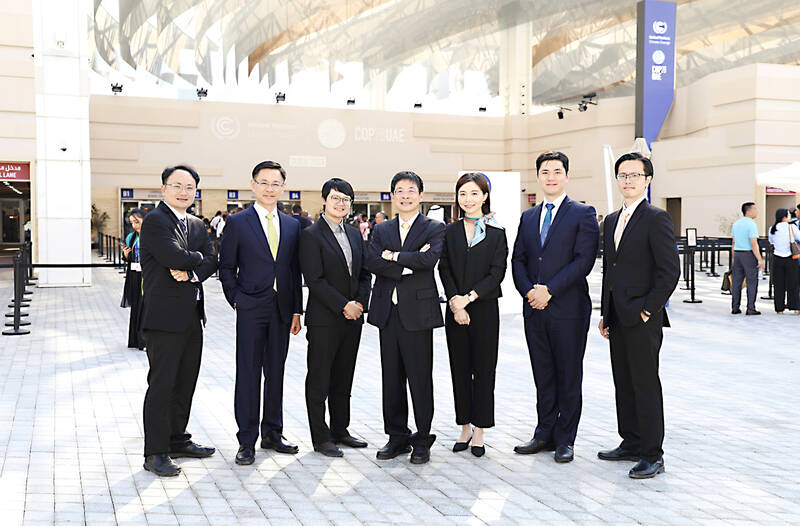The 28th United Nations Climate Change Conference of the Parties (COP28) is currently taking place in Dubai, United Arab Emirates. The conference focuses on issues such as the global stocktake (GST), mechanism for loss and damage, whether countries are proposing more ambitious Nationally Determined Contributions (NDCs) and the gradual elimination of fossil fuels.
Following COP27 in 2022, E.Sun Financial Holding chairman Joseph Huang once again leads the E.Sun Sustainability Team to COP28 to gain first-hand insights into the latest international trends and solutions for climate change and achieving net zero emissions.
In addition, political leaders, organizations and advocacy groups gathered at the World Climate Summit (WCS), the largest parallel conference to COP. Environmental ministers of many countries attended to express concerns about the negative impacts of climate change on the economy and people’s lives. Chairman Joseph Huang was once again invited to deliver a keynote speech on behalf of Taiwan’s financial industry with the topic “How Sustainability is Reshaping Taiwan’s Financial Market”. He shared how the financial industry plays a critical role in the sustainable transformation. The speech received enthusiastic responses from attendees worldwide.

Photo courtesy of E.Sun
Huang emphasized that climate change is a transnational and cross-industry issue. “If companies continue with business as usual, it will be difficult to tackle climate change. We need to do a little more, and go beyond our traditional business boundaries. Only by uniting everyone’s efforts can we have a chance of achieving the net zero target,” he said.
For example, E.Sun Bank has implemented various zero-carbon financial services, from encouraging customers to engage in green consumption and providing green building home loans to issuing carbon neutral credit cards and ATMs.
It also has plans in the works to gather carbon emission information about public transportation to encourage consumers to use public transportation. In corporate banking services, the bank has held an ESG Sustainability Initiative three years in a row, conducted one-on-one sustainability consultations with over 150 companies and established a “Sustainable Transformation Platform” in collaboration with 11 cross-industry consultants to provide practical solutions for corporate net-zero transformation.
Moreover, E.Sun serves as the rotating chair of the “Coalition of First-movers for Sustainable Finance” in 2024, promoting collaboration rather than competition and driving the overall net zero transformation progress of Taiwan’s financial industry and cooperating with the Financial Supervisory Commission and the net zero working group.
“The more we do, the more we can do!” When we do more, we are capable of doing even more. E.Sun believes that through international, governmental, industrial, and market collective efforts, everyone can contribute climate-friendly actions in their respective fields, which can be merged into a positive force that changes the environment and accelerates the net-zero transition, assisting Taiwan and the world in moving towards the beautiful vision of net zero by 2050.

Semiconductor business between Taiwan and the US is a “win-win” model for both sides given the high level of complementarity, the government said yesterday responding to tariff threats from US President Donald Trump. Home to the world’s largest contract chipmaker, Taiwan Semiconductor Manufacturing Co (TSMC, 台積電), Taiwan is a key link in the global technology supply chain for companies such as Apple Inc and Nvidia Corp. Trump said on Monday he plans to impose tariffs on imported chips, pharmaceuticals and steel in an effort to get the producers to make them in the US. “Taiwan and the US semiconductor and other technology industries

SMALL AND EFFICIENT: The Chinese AI app’s initial success has spurred worries in the US that its tech giants’ massive AI spending needs re-evaluation, a market strategist said Chinese artificial intelligence (AI) start-up DeepSeek’s (深度求索) eponymous AI assistant rocketed to the top of Apple Inc’s iPhone download charts, stirring doubts in Silicon Valley about the strength of the US’ technological dominance. The app’s underlying AI model is widely seen as competitive with OpenAI and Meta Platforms Inc’s latest. Its claim that it cost much less to train and develop triggered share moves across Asia’s supply chain. Chinese tech firms linked to DeepSeek, such as Iflytek Co (科大訊飛), surged yesterday, while chipmaking tool makers like Advantest Corp slumped on the potential threat to demand for Nvidia Corp’s AI accelerators. US stock

The US Federal Reserve is expected to announce a pause in rate cuts on Wednesday, as policymakers look to continue tackling inflation under close and vocal scrutiny from US President Donald Trump. The Fed cut its key lending rate by a full percentage point in the final four months of last year and indicated it would move more cautiously going forward amid an uptick in inflation away from its long-term target of 2 percent. “I think they will do nothing, and I think they should do nothing,” Federal Reserve Bank of St Louis former president Jim Bullard said. “I think the

SUBSIDIES: The nominee for commerce secretary indicated the Trump administration wants to put its stamp on the plan, but not unravel it entirely US President Donald Trump’s pick to lead the agency in charge of a US$52 billion semiconductor subsidy program declined to give it unqualified support, raising questions about the disbursement of funds to companies like Intel Corp and Taiwan Semiconductor Manufacturing Co (台積電). “I can’t say that I can honor something I haven’t read,” Howard Lutnick, Trump’s nominee for commerce secretary, said of the binding CHIPS and Science Act awards in a confirmation hearing on Wednesday. “To the extent monies have been disbursed, I would commit to rigorously enforcing documents that have been signed by those companies to make sure we get